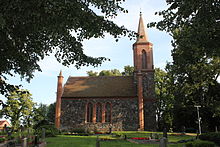Ernst von Heyden (politician, 1817)
Ernst von Heyden (born April 28, 1817 in Kartlow , † September 22, 1859 in Bredenfelde ; full name: Ernst Hans Heinrich von Heyden ) was a German landowner and member of parliament.
Life
Ernst von Heyden came from the Pomeranian noble family von Heyden and was the fourth son of Wichard Wilhelm von Heyden and his first wife Wilhelmine, nee. von Gloeden (1789-1820). Woldemar von Heyden (1809–1871), General Councilor of Pomerania, member of the United State Parliament of Prussia and builder of Schloss Kartlow , and Hermann von Heyden (1810–1851), member of the Prussian House of Representatives, District Administrator of the Demmin district and builder of the Leistenow manor , were his brothers.
He studied law at the Universities of Bonn and Heidelberg and lastly in 1839 at the University of Rostock . In Heidelberg he joined the Corps Hanseatia and in Bonn the Corps Borussia Bonn .
He inherited the Bredenfelde estate, acquired in 1816, from his father's extensive property holdings. Here from 1840 he had an English landscape park laid out according to plans by the Royal Prussian Horticultural Director Peter Joseph Lenné (1789–1866) and the neo-Gothic Bredenfelde manor house built from 1851 to 1855 based on designs by the architect Friedrich Hitzig and the neo-Gothic chapel based on plans by Friedrich Wilhelm Buttel .
With the possession of Bredenfelde directly connected was the membership of the knighthood and the ability to land . In contrast, it was not received by the Mecklenburg nobility until 1855. In the state parliaments, von Heyden belonged to the minority of the more progressive members of the Mecklenburg knighthood. In 1847 he called for the establishment of district courts and the abolition of patrimonial jurisdiction , to thereby prepare for the introduction of public and orality in judicial proceedings - which in Mecklenburg until the introduction of the Law on Courts should happen 1879th In the same state parliament, he unsuccessfully campaigned to allow marriage between Jews and Christians.
In the spring of the revolutionary year 1848 he was one of the representatives of Mecklenburg in the Frankfurt pre-parliament , which was supposed to prepare the election of the Frankfurt National Assembly. To this end it worked closely with the Bundestag of the German Confederation . The assembly met from March 31 to April 3, 1848 in the Paulskirche in Frankfurt .
Since 1842 he was a member of the Association for Mecklenburg History and Archeology .
He was initially married to Bertha, geb. Oerthling (1820-1847). His second marriage was on May 30, 1849, Charlotte (Lolo), b. Baroness von Brandenstein (1831–1908). She took over the management of the estate after his death. After her death in 1908, the only son, Ministerialrat a. D. Ernst Werner von Heyden (1859–1932) continued the farm until 1931.
literature
- Joseph Meyer : German Parliament Chronicle. A political textbook for the German people. Volume 1. Hildburghausen 1848 ( digitized version )
Web links
Individual evidence
- ↑ Entry in the Rostock matriculation portal
- ↑ Kösener Corpslisten 1910, 19 , 126; 113 , 85
- ^ Gustav von Lehsten: The nobility of Mecklenburg since the land constitutional hereditary comparisons (1755). Rostock 1864, p. 108
- ↑ Meklenburgische Blätter 1 (1847), p. 238
- ^ L. Donath: History of the Jews in Mecklenburg: from the oldest times (1266) to the present (1874); also a contribution to the cultural history of Mecklenburg. Based on printed and unprinted sources. Leipzig: Leiner 1874, p. 217
| personal data | |
|---|---|
| SURNAME | Heyden, Ernst von |
| ALTERNATIVE NAMES | Heyden, Ernst Hans Heinrich von (full name) |
| BRIEF DESCRIPTION | German landowner and member of parliament |
| DATE OF BIRTH | April 28, 1817 |
| PLACE OF BIRTH | Kartlow |
| DATE OF DEATH | September 22, 1859 |
| Place of death | Bredenfelde |

